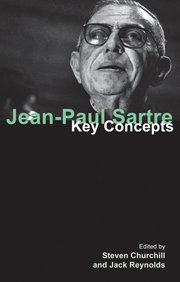2 - Life and works
Summary
The keynote speaker at the 2011 UK Sartre Society Conference in London was Annie Cohen-Solal, Sartre's foremost biographer and author of the magnificent Jean-Paul Sartre: A Life (Cohen-Solal 2005). Her chosen theme was a series of public lectures Sartre gave in the early 1930s, during his time as a school teacher in Le Havre. Sartre's time in Le Havre has been characterized as his wilderness years – the brilliant student of the prestigious Parisian École Normale Supérieure exiled to the provinces, unappreciated, unpublished and unhappy. Yet they were also hugely formative and creative years for Sartre: a nine-month sabbatical in Berlin in 1933 to study the phenomenology of Edmund Husserl and the incessant revising of a work on contingency that eventually became the classic existentialist novel Nausea (Sartre 1938, 1965a).
Sartre's chosen theme for his public lectures was literature. Like his great friend and lifelong intellectual sparring partner, Simone de Beauvoir, Sartre was interested in contemporary English and American literature; in the novels of Virginia Woolf, James Joyce, Aldous Huxley, John Dos Passos and William Faulkner. Sartre's original lecture notes are lost, but fortunately Cohen-Solal possesses photocopies of several pages of them. She told an enthralled conference how she was summoned one morning by de Beauvoir, who appeared at the door of her Paris apartment in one of her famous turbans. She did not invite Cohen-Solal in, but handed her a sheaf of papers with strict instructions to have the material back by the end of the day.
- Type
- Chapter
- Information
- Jean-Paul SartreKey Concepts, pp. 5 - 11Publisher: Acumen PublishingPrint publication year: 2013

